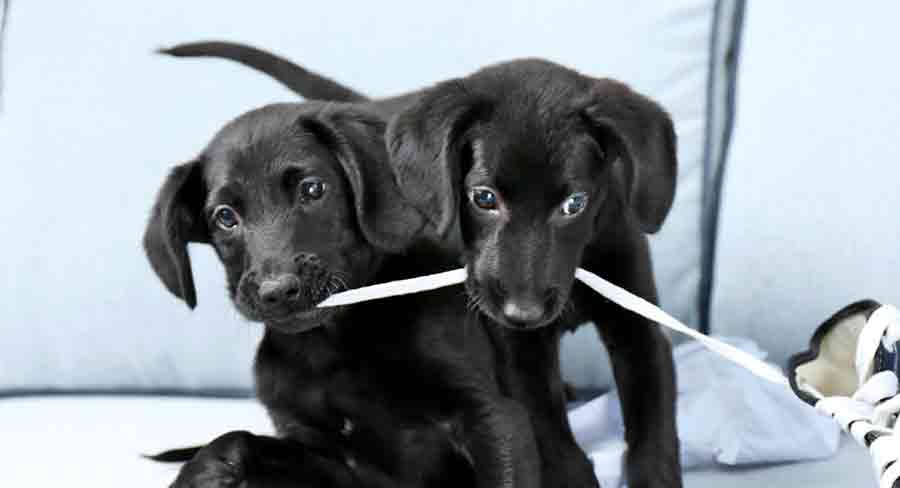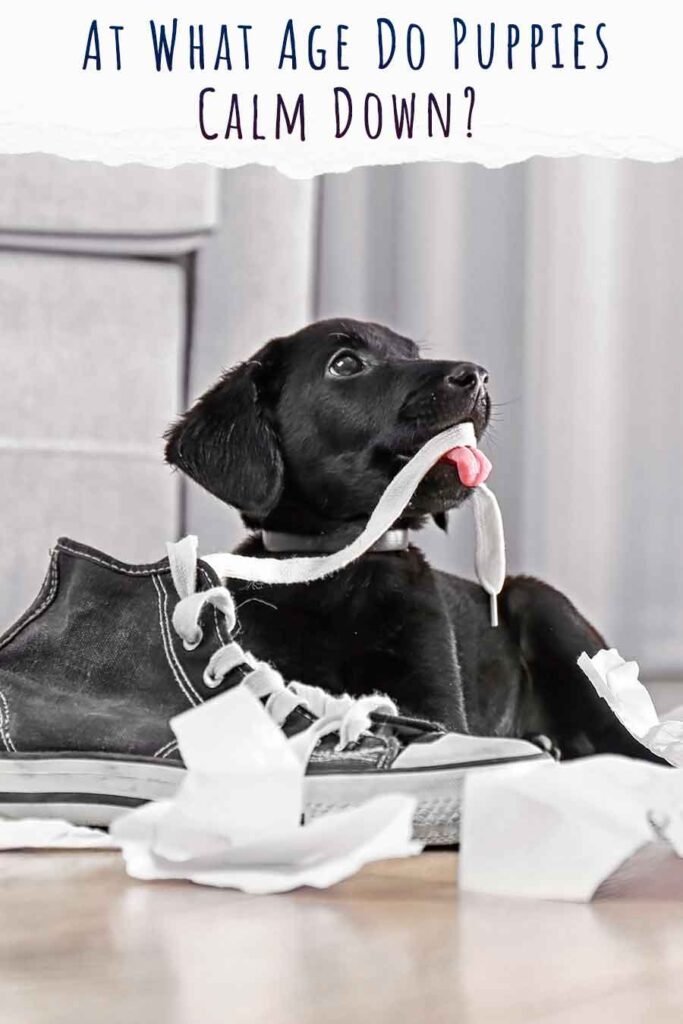
In this article we address a question close to the heart of many puppy parents – at what age do puppies calm down? We’re happy to reassure you that there is an end in sight. And there are simple things you can do to help your chaotic puppy mature into a peaceful adult as early as possible.
The age a puppy calms down depends upon things like their breed, their individual personality, and what kinds of behavior you reinforce as they’re growing up.
When Do Puppies Calm Down?
Puppies are tiny powerhouses of enthusiasm and zest for life. But they aren’t born knowing how to regulate their energy levels, and this is something they’re going to have to learn as they grow up. In the meantime, it can feel like their activity levels are always all-or-nothing: fast asleep, or totally wild! And all too often, it’s easy for excited puppies to become over-excited puppies. These are just some of the things you might be up against:
Sharp teeth
One of the most frustrating and upsetting features of an excited puppy is frequently their teeth. Puppies use their teeth to explore the world, and also to play with one another. Teething puppies also have a strong urge to bite down on things to relieve the aching sensation in their jaws.
Zoomies
Another trademark move of the excited puppy is the ‘zoomies’. Puppies with the zoomies tear around at top speed, executing daredevil turns and jumping over furniture. Puppy zoomies tend to be especially common in the early evening, after dinner but before bed.
Embarrassment
Puppies don’t just get over excited at home. Out and about, the stimulation from lots of sights, sounds and smells can trigger even more excited behavior. And it’s often accompanied by other difficult or embarrassing behaviors, such as leash pulling or persistent barking. Over the long term, this can even damage an owner’s emotional bond with their puppy, and increase the risk of them being surrendered to a shelter.
Will My Puppy Ever Calm Down?
If you can relate to these experiences, and you’re nearing the end of your rope, you’re not alone. In the comments section of our articles, on our Labrador Forum, and the student forum for our Dogsnet courses, we regularly hear from exhausted and frustrated puppy parents who want to know at what age do puppies calm down.
Lots of us, when we pictured life with a dog, were thinking of the dog owners we’ve seen at the park, strolling peacefully with their pet. And the reality of a lively puppy can cause a serious case of the blues. But trust me when I say that every dog you’ve ever seen walking peacefully alongside their owner, or sitting patiently while their human chats with a friend, was once an excitable puppy too.
And the truth is, there isn’t an age at which puppies suddenly calm down overnight. But, all puppies grow up eventually, and there’s lots you can do to teach them calm habits on the way.
What Affects The Age A Puppy Calms Down?
Growing up and calming down is a mix of two things: physical maturity, and learned skills. Or in other words, the age your puppy will calm down is determined by a combination of both biological factors and environmental factors.

At What Age Do Puppies Calm Down? Biological factors
Some of the factors that affect when a puppy calms down are innate.
Breed
For example, dog breeds originally bred as livestock guardians, such as the mighty Bernese Mountain Dog and the snowy Great Pyrenees tend to have long puppyhoods, and retain puppyish behaviors for longer than average. This is genetic, and it’s a fundamental part of what makes them good at their jobs too. Staying in a puppy mentality for longer means they form a more emotional, protective connection to their flock.
Traditional working dog breeds such as Border Collies, English Cocker Spaniels, and American-type Labrador Retrievers also take longer to calm down. But this time it isn’t because they are maturing at a slower rate. It’s because they’ve been bred to have SO much energy and stamina, that they have a lot more to lose before we tend to think of them as being calm.
Size and shape
The role of size and shape is to pin down. Small dogs reach full physical size quicker than large dogs, but the same can’t be said for mental maturity. The research conducted so far suggests that all sizes of dog achieve cognitive maturity at the same time – between a year or two old.
In addition, small breed puppies such as Pomeranians and Yorkshire Terriers, as well as brachycephalic breeds such as French Bulldogs and Pugs, are more likely to be described by their owners as excitable and hyperactive for longer than many large breed puppies.
So the age a puppy calms down has more to do with their temperament (which is partly determined by their breed), than their size.
Age
Finally, lots of excitable puppy behaviors, like the zoomies, tend to reduce simply as a natural result of age. Just like few of us still have the same level of uncontrolled energy at 30, that we had at 5 years old.
When Do Puppies Settle Down? Environmental Factors
Happily, not everything is outside of your control. Environmental factors are things you can control to help guide your lively puppy grow into a calmer dog.
1. Routine
Puppies thrive on routine, with clear times for playing, exercising, training and resting. When you feel in control of your puppy’s schedule, and they feel confident and secure that they know what’s expected of them next, everyone also feels calmer.
2. Socialization
Socialization is the process of introducing a puppy to lots of new things before they reach 12 weeks old. Before that age, they are very open to forming positive associations with new things, which means they’ll react more calmly and confidently to them in future too. Puppies who aren’t well socialized are more likely to react fearfully to everyday encounters, and be constantly on high alert.
3. Reinforcing calm
Your puppy is continuously learning from the consequences of their actions. When they do something and life gets better, they do more of that thing. When they do something and life gets worse, or nothing changes at all, they repeat the behavior less. This has two important effects on how quickly they calm down generally. Firstly, if you reward calm behavior by quietly placing a treat between their paws, they are more likely to offer the same calm behavior again, and build up a habit of behaving calmly. Secondly, if you ignore calm behavior, and let it go by unnoticed, they will be less likely to offer it again.
You can also apply the same rules to overexcited behavior. If you reward overexcited behavior with attention, they will be more likely to repeat it. But if you disengage and leave them to calm down on one side of a barrier, whilst you about your business on the other, they’ll be less likely to repeat the behavior.
When Will My Puppy Start To Calm Down?
So you’re doing everything right. You’ve socialised your puppy carefully, established a predictable daily routine, and you’re disengaging from wild behavior whilst reinforcing calm behavior with tasty treats. But they’re still very full-on.
Stick at it. When you’re raising a puppy, the days are long, but the months are short, and it won’t be long before you start to see a change in them. Most people report that the first big improvement they notice in their puppy’s behavior takes place between 4 and 6 months old. Roughly compared to a human being, this is the time they stop being a toddler, and become more like an older child. They’re still full of energy and fun, but they’re more capable of regulating their energy, and recognizing when it’s time for a nap.
Another landmark is around their first birthday. Forget the idea that each year of a dog’s life is directly equivalent to 7 human years. During their first year of life a dog goes through puberty and reaches (or at least gets pretty close to) physical and mental maturity. In fact, researchers think a 1 year old dog is more closely comparable to a 30 year old human than a 7 year old child! And their excitement levels reflect this. They’re still athletes, and they still have lots of energy, but for lots of dogs, the unbridled excitement of their youth has worn off.
Over the course of their lifetime, you’ll probably notice one or two more distinct changes in their energy levels as well. Some owners report a perceptible shift into ‘middle age’ at around 3 years old – especially in non-working breeds.
When Do Puppies Calm Down – Does Diet Matter?
The potential for a puppy’s diet to change their behavior and make them more hyperactive or more calm is an interesting one. Anecdotally, lots of puppy parents believe they have seen a change in their puppy’s energy and behavior as a result of changing their diet. The problem is that none of these experiences were standardised, so some people end up attributing positive changes in behavior to feeding more protein, and some people end up attributing positive behavior changes to eating less protein. But quite often we don’t know exactly what changes were made, and what other factors might have influenced their puppy’s behavior.
So whilst scientists agree that nutrition has the potential to change behavior, as long as your puppy is eating an age- and breed- appropriate diet, then the case for changing it is weak. However, chat to your vet if you have any concerns at all about your puppy’s nutrition.
At What Age Do Puppies Calm Down – Summary
Puppies usually become perceptibly calmer between 4 and 6 months old, and again around their first birthday. However, lots of factors, including their breed, and whether you’ve built up a history of reinforcing calm behavior will influence this.
Are you still waiting for your puppy to calm down? These resources elsewhere our the site can help:
- Puppy Development Stages with Growth Charts and Week by Week Guide
- Over Excited Dog: How Understanding Behavior Thresholds Can Help You
- Loose Leash Walking: An Expert Guide to Getting a Relaxing Stroll
- Calm Dog Breeds – The Most Relaxed Canine Companions
References
Bosch et al. Impact of nutrition on canine behavior: current status and possible mechanisms. Nutrition Research Reviews. 2007.
Gazzano et al. Effects of early gentling and early environment on emotional development of puppies. Applied Animal Behavior Science. 2008.
Hoffman et al. Do Dog Behavioral Characteristics Predict the Quality of the Relationship between Dogs and Their Owners? Human Animal Interaction Bulletin. 2013.
Martin. Getting Puppy Started Off Right: Preventing Puppy Behavior Problems. World Small Animal Veterinary Association Congress Proceedings, 2017.
Serpell & Duffy. Dog Breeds and Their Behavior. Domestic Dog Cognition and Behavior. 2014.
Wang et al. Quantitative Translation of Dog-to-Human Aging by Conserved Remodeling of the DNA Methylome. Cell Systems. 2020.
Watowich et al. Age influences domestic dog cognitive performance independent of average breed lifespan. Animal Cognition. 2020.

Leave a Reply